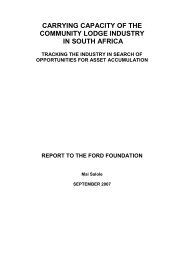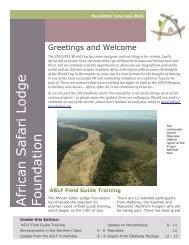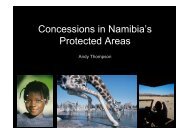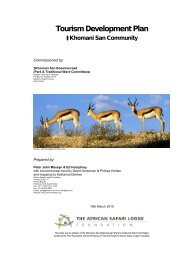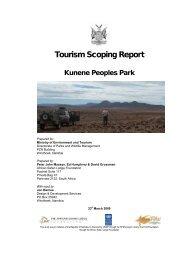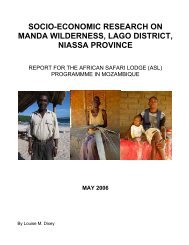Evaluating outcomes at Madikwe and Makuleke by Peter John Massyn
Evaluating outcomes at Madikwe and Makuleke by Peter John Massyn
Evaluating outcomes at Madikwe and Makuleke by Peter John Massyn
You also want an ePaper? Increase the reach of your titles
YUMPU automatically turns print PDFs into web optimized ePapers that Google loves.
However, in a few recent cases, poor rural communities have acquired formal l<strong>and</strong> rightsin core protected areas <strong>and</strong> used these rights to achieve high levels of particip<strong>at</strong>ion in thetourism industry. This paper considers two such examples from the north of South Africa.In the first case, the Balete <strong>and</strong> B<strong>at</strong>lokwa community obtained lease rights to a primetourism concessions in the <strong>Madikwe</strong> Game Reserve. In the second, the <strong>Makuleke</strong>community acquired ownership of a portion of the Kruger N<strong>at</strong>ional Park through postapartheidl<strong>and</strong> restitution. The paper critically examines the terms on which thesecommunities integr<strong>at</strong>ed their newly acquired assets into the market. In both instances, aclear rights framework, strong commercial orient<strong>at</strong>ion, competent technical advice <strong>and</strong>responsiveness to local institutional conditions contributed to strong <strong>outcomes</strong>. And, inboth cases, broader structural reform <strong>at</strong> the n<strong>at</strong>ional level cre<strong>at</strong>ed conditions seeminglyconducive to an applic<strong>at</strong>ion of the approach <strong>at</strong> scale.The paper notes these successes but also questions whether the <strong>outcomes</strong> have beenoptimal from a local perspective. There are indic<strong>at</strong>ions th<strong>at</strong>, while the communities havebenefited considerably from their ownership of valuable resource rights, especially the<strong>Makuleke</strong>s may not have optimised the integr<strong>at</strong>ion of their l<strong>and</strong> into the market.Much has been written about the two cases. The paper draws on this wide-rangingliter<strong>at</strong>ure but also on the author’s extensive personal experience as a facilit<strong>at</strong>or intim<strong>at</strong>elyinvolved in both cases over a period of more than a decade.2. THE MADIKWE EXPERIENCE 72.1 BackgroundDuring the l<strong>at</strong>e 1980s, the former South African government expropri<strong>at</strong>ed farml<strong>and</strong>sbelonging to white commercial interests along the Botswana border for incorpor<strong>at</strong>ion intothe then “independent” Bophut<strong>at</strong>swana. Based on a compar<strong>at</strong>ive l<strong>and</strong> use study th<strong>at</strong>argued the rel<strong>at</strong>ive merits of market-based wildlife tourism as the most efficient economicuse of the l<strong>and</strong>, the bantustan government opted to establish a major new game reserveoptimize cost recovery. The new approach to public conserv<strong>at</strong>ion thus sees the st<strong>at</strong>e seeking to offset thecosts of protected area management through the optimal harvesting of returns from commercialdevelopment on the l<strong>and</strong>. A critical consequence of the approach is reluctance <strong>by</strong> the st<strong>at</strong>e to cederesource rights – <strong>and</strong> rentals – in core protected areas to local rural residents. On the contrary, the st<strong>at</strong>eoften insists th<strong>at</strong> local interests compete in an open market for access to commercial opportunities <strong>and</strong>pay competitive rents for the use of the l<strong>and</strong>.7 The author was involved in the <strong>Madikwe</strong> Initi<strong>at</strong>ive as a director of the initi<strong>at</strong>ive’s implementing agency.The case study draws on personal experience <strong>and</strong> various rel<strong>at</strong>ed public<strong>at</strong>ions./6










